1. Introduction
Yamaha CRW2100S SCSI
CDR-W - Page 1
by K.S
Introduction :
 CDR-102
SCSI was the first CD Recorder I have ever owned. It was a breakthrough back
then, with all this great reading/writing capabilities… After that I went
for a Yamaha 4x4x16 CDR which was later replaced by the Yamaha 8x4x24 CDR drive.
Well, If someone ever asked me, what cdr would he/she buy back then, I'd certainly
propose for a Yamaha series CDR drive. That was back then… But, how about
nowadays?... Today Yamaha is still here. In the meantime however, several new
'players' invaded into the cd-recording playground… Sometimes they had
better things to offer, inovative technologies to propose (BURN-PROOF, JUSTLINK),
not to mention the higher recording speeds. Yamaha undoubtedly is one of the
best CDR manufacturers in the CDR-industry. So, it's next move should have been
fast and efficient. The CDRW2100x series came to fill the empty gap on the top
of Yamaha CDR-devices. Everyone knew that those drives should have been unique
and fast… at least faster than the competition…
CDR-102
SCSI was the first CD Recorder I have ever owned. It was a breakthrough back
then, with all this great reading/writing capabilities… After that I went
for a Yamaha 4x4x16 CDR which was later replaced by the Yamaha 8x4x24 CDR drive.
Well, If someone ever asked me, what cdr would he/she buy back then, I'd certainly
propose for a Yamaha series CDR drive. That was back then… But, how about
nowadays?... Today Yamaha is still here. In the meantime however, several new
'players' invaded into the cd-recording playground… Sometimes they had
better things to offer, inovative technologies to propose (BURN-PROOF, JUSTLINK),
not to mention the higher recording speeds. Yamaha undoubtedly is one of the
best CDR manufacturers in the CDR-industry. So, it's next move should have been
fast and efficient. The CDRW2100x series came to fill the empty gap on the top
of Yamaha CDR-devices. Everyone knew that those drives should have been unique
and fast… at least faster than the competition…
- Package:
The RETAIL version that arrived in our offices included the drive itself
(CRW2100S-VK), SCSI/Audio cables, additional jumpers for setting the SCSI ID
to another number (other than 3 which is the default), and 4 screws for the
drive consolidation into a computer's 5,1/4" bay. The software included
was the Adaptec's Ez CD Creator 4.02d-S25 version, DirectCD 3.0 and Take Two
1.0 (all into one cdrom). The package also included an additional Yamaha CDR
(16x certified), an HS-RW media and finally, the user manual (very well printed,
high detailed; essential for novice users).

The front of the CRW2100S-VK is very typical. It includes the "16/10/40"
logo as well the HS-RW standard logo. The drive uses only one lens for letting
you know what exactly the drive does (red when writing, green when reading).
Finally, you will find the manual eject hole and the headphone jack/volume control
which most CD-Rom/RW drives have.

In the back of the drive you can see the usual connectors for SCSI devices
as well a short description above them. No cooling fan is supplied with
the drive, which in all our tests seems to have a normal temperature even after
a long and painful use.
- Installation:
 The
installation was pretty easy. We only had to change the SCSI-ID from 3 (default)
to 5. During the boot-up, the SCSI host adapter identified the drive as Yamaha
CRW2100S. We then made some minor configuration changes to Windows ME. These
were: disabling auto-insert notification and checking Sync Data Transfer (very
important if your SCSI adapter has no bios - we checked it anyway). The supplied
drive was manufactured in December 2000 and the onboard firmware revision was
version 1.0H. We also installed the bulked Ez CD Creator 4.02d-s25 for tests
but we mainly used Nero 5.0.4.0/Ahead InCD v1.80.
The
installation was pretty easy. We only had to change the SCSI-ID from 3 (default)
to 5. During the boot-up, the SCSI host adapter identified the drive as Yamaha
CRW2100S. We then made some minor configuration changes to Windows ME. These
were: disabling auto-insert notification and checking Sync Data Transfer (very
important if your SCSI adapter has no bios - we checked it anyway). The supplied
drive was manufactured in December 2000 and the onboard firmware revision was
version 1.0H. We also installed the bulked Ez CD Creator 4.02d-s25 for tests
but we mainly used Nero 5.0.4.0/Ahead InCD v1.80.
-Yamaha CRW-2100S and Nero 5.0.3.1:
 At
the time we were performing these tests, we were mainly using (at the beginning)
the Nero 5.0.3.1. Under this application CRW2100S seems that it was not properly
recognized. Therefore with a common CDRW media test (not HSRW) we had the following
results: The drive reported that it was able to write at 16x (2400k/s) but the
whole process was actually working at 4x (600k/s) - we identified this with
windows system monitor...
At
the time we were performing these tests, we were mainly using (at the beginning)
the Nero 5.0.3.1. Under this application CRW2100S seems that it was not properly
recognized. Therefore with a common CDRW media test (not HSRW) we had the following
results: The drive reported that it was able to write at 16x (2400k/s) but the
whole process was actually working at 4x (600k/s) - we identified this with
windows system monitor...

This problem ceased to exist on the latest Nero 5.0.4.0 (private
beta version), which identifies both media and drive properly. We suggest that
you upgrade to this version, once it's fixing such problems.
- Test Machine:
WinMe OS
Soyo 7VCA
Celeron II 566 over clocked to 850 MHz
128MB SDRAM PC 133
VIA 4 in1 4.27
VIA IDE BUS 3.01.1 (miniport version)
WD 18GB UDMA 66
Quantum Fireball EX 6.4GB
SCSI card: DAWI 2975 - PCI (ULTRA)
ATI AIW 128
Hitachi GD-7500 IDE DVD-ROM
PleXWriter PX-W1610A firmware v1.00 (TLA #0000)
Sanyo CRD-BP4 firmware v4.28
TDK CyClone 161040 firmware v5.29
Yamaha CRW2100S firmware v1.0h (SCSI-ID 5)
2. Data Tests
Yamaha
CRW2100S SCSI CDR-W - Page
2
Data Tests
Test Method:
- SCSI Mechanic v3.0.224: This was used to compare the Yamaha's I/O
performance against other various CDR-W drives (see charts). We used a pressed
CD containing PlexTools v1.06 for all of the tests.
- CD Speed 99 v0.80 was also used to check the drive performance with
pressed CDs. For that test we used PlexTools v1.06 original CD.
- SCSI Mechanic v3.xx results:

As you can see from the graph above, the CRW2100S goes pretty well compared
with the Sanyo CRD - BP4 and the TDK Cyclone 161040 but not as well as the PX-W1610A
(which keep in mind it's the ATAPI model)...
- CD Speed 99 v0.80 results: (click here
for the CD Speed graph)
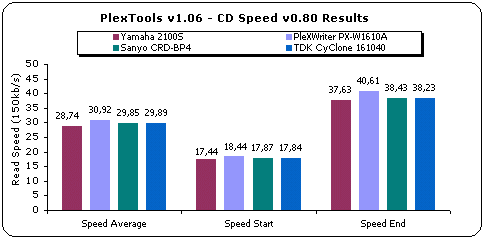
Using CD Speed 0.80, we can see that the CRW2100S clearly is the slowest
CDR-W drive of all four, but with a minimal difference.

The CRW2100S performs very well and seems to be able to compete the competition
to the Full seek tests, while in the 1/3 test leaves back only the Plextor drive
and in the Random seek test is left behind by both Sanyo and TDK recorders.
Verdict of data (pressedCDs) tests:
The Yamaha CRW2100S is one of the fastest CDR-Ws drives you can buy, but
sure has many opponents to compete. Its average reading speed using PlexTools
v1.06 was 28.74x, while the other drives were a bit faster (with the PX-W1610A
being the fastest solution). It's seek times are better than the Plextor model
but cannot reach the Sanyo's and TDK's ones (Random & 1/3). In the SCSI
Mechanic tests, the CRW2100S delivers a pretty good performance in the
"Average Random I/O" test but is left behind by the PX-W1640A. The
drive delivered an average sequential reading result of 4.23mb/s, which is *a
bit* lower than the competition. The drive also has the second best "Average
Same Sector I/O" being left behind by the PX-W1610A drive only. The negative
point of the drive's performance is the noise that the drive generates when
reading at max speed. Very annoying :(
3. RW reading tests
Yamaha
CRW2100S SCSI CDR-W - Page
3
RW reading tests
For the RW tests we used Ricoh HS RW media written at 8x speed. The
Yamaha CRW2100S refused to read HS RW media that was written at 10x so
we lowered the speed to 8x in order to complete the test:

The CRW2100S continues to read very fast RW media and gave back the best average
reading speed around 30x!
CloneCD Tests
- Procedure:
We used CloneCD (v2.8.4.2) and 3 original CDs (Rally Masters, Euro2000 and
Vrally 2 Expert) in order to test the reading time for Yamaha CRW2100E (firmware
v1.0H). We also tested the reading performancenai with backups of the original
CDs since the reading speed varies among original and backup media. For comparison
reasons we added the results from PleXWriter PX-W1610A and Sanyo CRD-BP4/TDK
CyClone 161040.
- Results:
a) SafeDisc Results: Euro 2000 (Total: 257982 sectors - 10141 bad sectors)
- Reading Speed: Max
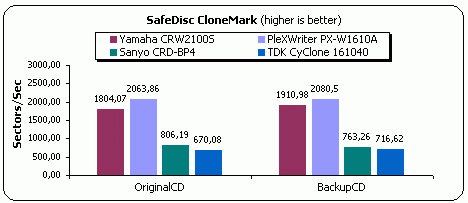
The Plexwriter PX-W1610A leads with the Yamaha CRW2100S following
the race when reading SafeDisc protected CDs. What is noticeable here is that
both the Yamaha and Plextor drives improve the reading speed when the
backup CD is used.
b) LaserLock Results: Rally Masters (Total: 321528 sectors
- 6317 bad sectors) - Reading Speed: Max

From the past test's experience most drives have serious problems when reading
LaserLock protected CDs. The CRW2100S comes second behind TDK 161040 when reading
Original CDs but last of all when reading the Backup CD. There is an issue here
since the drive reports more bad sector than the existing one.. That could cause
problems when using the Yamaha 2100S as a reader for LaserLock protected CDs.
:(
c) SecuROM Results: Vrally2 Expert - 343767 sectors
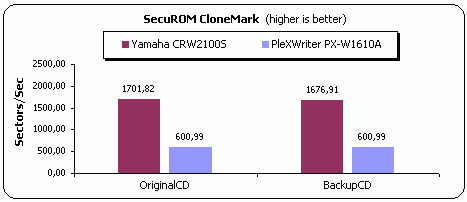
The Yamaha CRW2100S is simply the BEST in SecuROM tests. It reads it with
incredible fast speed and bypass the competition with a great distance gap.
Of course we have tested the backup, with Yamaha as the reader source, and it
worked fine.
4. DAE Tests
Yamaha
CRW2100S SCSI CDR-W - Page
4
DAE Tests
Test Method:
We used CD DAE 99 v0.2 with AudioCDs in order to check DAE performance
of the Yamaha CRW2100S and we compared it with the Plextor PX-W1610A, Sanyo
CRD-BP4, and TDK Cyclone 161040 models.
- Pressed AudioCD results: (check here
the CD Speed graph)
Yamaha advertises that the new CRW2100x series drives are capable of doing
DAE with a speed up to 40x (max). Our tests confirmed that claim and
with pressed CDs Yamaha CRW2100S is one of the new leaders when it comes to
the DAE race. It managed to deliver 27.2x average ripping speed bypassing
the other 2 competitors, but not the Plextor one (29,7%):
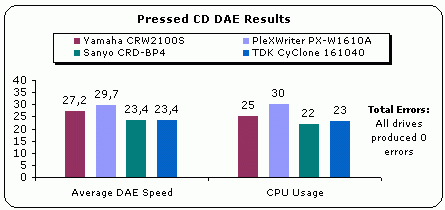
- Pressed AudioCD:
The PX-W1610A continues to lead the race of the fastest DAE drive around
and climbs up to 31.5x. CRW2100S comes second with 27.6x; Sanyo CRD-BP4
third with 23.7x and TDKCyclone 161040 comes last with only 23.4x:

- Advanced DAE Quality:

Plextor leads this benchmark too. All drives are getting a 100 (perfect) score
in the Advanced DAE quality CD Speed tests. Of course Yamaha is a faster than
the 2 other competitors (TDK and SANYO) but not faster than Plextor. Last, but
not least Yamaha CRW2100S seems be able to read 90min CDs without any problem
and stops reading at around 92:28" mins when we use 99min CDs.

Verdict of DAE Results:
The Yamaha CRW2100S has a pretty fast DAE performance for a CDR-W drive
since it delivers almost 28x average ripping speed. Its max speed is
40x (which is never achieved) but in most cases you will see a max of 38x (we
got a 39.3x once). Also the drive's DAE quality is perfect which is also what
the competition has got. On the other hand we got the Plextor's new "diamond"
which seems to lead the race in almost all cases. The drawback (?) is that the
later is on ATAPI Protocol, while the Yamaha is an SCSI device.
5. CDR Tests
Yamaha
CRW2100S SCSI CDR-W - Page
5
CDR Tests
The Yamaha CRW2100S is one of the first SCSI recorders that supports 16x writing
(even partial). The specifications state: Writing: 1X, 2X, 4X, 8X, 12X (CLV),
16X (12X-16X Partial CAV). As you understand, partial CAV is not as fast as
full 16x CLV would be (theoretically).
According to Yamaha the difference in time would have been less than 15sec
which is confirmed by comparing the YAMAHA with the 16x CLV drive from Sanyo
(CRD-BP4) which supports full 16x CLV writing... (actually both drives gave
us the same times when burned 74min cds!).
 As
you already know if you read CDRINFO tests, the newest CD Speed 99 v0.8
has build-in write tests for testing the writer's recording speed! If you insert
a blank CD and press the start button you will see that the drive will start
recording in start from 12.36x and at the 14mins climbs up to 16x and continues
till the end. According to CD Speed the average writing speed of the Yamaha
CRW2100S is 15.75x average.
As
you already know if you read CDRINFO tests, the newest CD Speed 99 v0.8
has build-in write tests for testing the writer's recording speed! If you insert
a blank CD and press the start button you will see that the drive will start
recording in start from 12.36x and at the 14mins climbs up to 16x and continues
till the end. According to CD Speed the average writing speed of the Yamaha
CRW2100S is 15.75x average.
- Procedure:
We tested the Yamaha CRW2100S with the software that supports it and with
several media:
- Software used: Nero v5.0.4.0 / CloneCD v2.8.4.2 / Ez CD
Creator 4.0d-s25
- Media: Princo 74 & 80min / Ricoh Platinum 74 & 80min / Mitsui Gold
& SG / TDK 74 & 80 min / Verbatim 74min / Ricoh HS RW / YAMAHA
HS RW media
- CD-R Tests:
The Yamaha CRW2100S comes with Ez CD Creator v4.0d-s25. We got the latest
update to 4.0e and we made some burns with it. The Ez CD Creator worked ok at
most cases but it becomes very sensitive when the multitasking time comes.
If you push the system it won't be able to continue writing. On the other
hand Nero 5.0.4.0 surprised us since it manages to be very solid and you must
push your system pretty hard to make a buffer underrun. Remember that the drive
doesn't support any kind of anti-coaster technology as the competition does
(BURN-Proof or JustLink).
For most of our tests we used Nero v5.0.4.0. We made a Data CD job with data
slight higher than 74mins (74:03:65). We burned the same job with all 4 CDR-W
drives:

The CRW2100S and BP4 gave us the same burning times (404sec) and both
come first compared to the PX-W1610A and the TDK 161040. The Average CPU usage
is the smallest (but with minimal difference) of the competition.
- 80min CDs:
As in the previous benchmark we created a DataCD with Nero 5.0.4.0 and used
the same media for all burns:

As we saw before with the 74min CDs, all of four drives had minimal timing
differences between them. The Yamaha CRW2100S finished the task in 439 sec,
4 more than the PLEXTOR and 5 more than the other 2 competitors.
- 16x writing with 80min CDs:

Here we have a significant difference... While with the 74 min cds we had
almost no time differences between the competitors, with the 80 min cds there
is a gap of 17-18 secs. Is this the 15 secs that Yamaha was talking about? Is
it truly based to the partial CAV burning...? most possible yes... The above
times are a bit higher than the one Yamaha gives, since they include the lead-in
and lead-out writing times.
- Overburning Tests:
The CRW2100S can burn up to 92:28 min CDs without any problems. We used
90min CDs (from Medea
International) and by using Nero we burned them up to 92:28 mins without
any problem at 16x (6:44mins). The drive refuses to write more than 92:29 mins
which means that you cannot use the drive for writing 99min (or higher) CDs.
- AudioCD Tests:
We created several Audio CDs (including CD-Text). All of the CDs we created,
were tested with the Plextor PX-40TS and Plextor's CD-Text compatible CD player.
From what we saw, everything worked just fine.
- CloneCD Tests:
 Yamaha
added DAO-RAW support with 1.0h firmware revision. In order to use the Yamaha
2100E/S you need to get the v2.8.4.1 version (or later) of CloneCD which now
supports fully the drive.
Yamaha
added DAO-RAW support with 1.0h firmware revision. In order to use the Yamaha
2100E/S you need to get the v2.8.4.1 version (or later) of CloneCD which now
supports fully the drive.
Notice that the DAO-RAW works perfectly and will help you backup your favorite
protected CDs. Last the Yamaha 2100S will NOT make working backups of SafeDisc
2 protected CDs, as 90% of the current selling recorders does.
- Buffer Underrun tests:
It's clear so far that the drive doesn't support any kind of anti-coaster
technology. According to Yamaha the combination of 8mb buffer and LSI chipsets
will prevent any buffer underrun. Could this be true? Yes and no. The tests
always speak the truth, so read on...;-)
The OEM/retail package of CRW2100x series arrives with Ez CD Creator v4.0d-s25,
which supports 16x-writing speed. It worked ok for most tests except the ones
for buffer underruns. It's weakness it's obvious when you will start to multitask
several applications. On the other hand Nero seems very stable, at least when
burning at 16x from HD, even when you start "pressing" your PC. However
if you push your luck too hard, you will soon have yet another coaster for your
collection...
When the going gets tough, both NERO and EZ CD CREATOR seem very unstable
when it comes the time for CD-to-CD copy; especially for AudioCD duplicate.
Again Nero works slightly better but a coaster is on the way if HEAVY multitasking
starts. This is a SCSI drive so, we used 2 drives :Plextor PX-40TS on the same
adapter (DAWI) for several on the fly copies with Nero,(no problem until we
pushed TOO hard) and the Hitachi GD7500 DVD (ATAPI) as a source in the second
case. In the later case, when we opened 2-3 applications, the machine gave us
buffer underruns. That means that high-speed writing really needs anti-coaster
technologies - such as existing BURN-Proof or JustLink (or a fast SCSI
drive like Plextor PX-40TS or better)
Verdict of CDR Results:
The Yamaha CRW2100S performed very well in most of our CDR Tests. The drive
supports 16x-writing speed, which even though is not full 16x (15.76x average),
works very good. The 8mb buffer and the proper software will generally protect
you from buffer underruns, but don't expect miracles. With normal use (Internet
Surfing, Word, Excel) the drive will work at 16x without any problems. Problems
will appear when you start opening too many memory aggressive applications (EVEN
if you have a SCSI reader). If you open applications that use the HD very much
you will probably get a coaster too. The drive supports DAO-RAW, and users will
find it useful. Last but not least the drive supports overburning and goes up
to 92:28 mins.
6. RW Writing Tests
Yamaha
CRW2100S SCSI CDR-W - Page
6
RW Writing Tests
The Yamaha CRW2100S doesn't support real 10x (CLV) writing speed with HS RW
media. It supports 4x-10x (Full CAV) recording speed in Fixed Packet Writing.
We used Nero 5.0.4.0 for writing CDs in maximum RW writing speed for all the
tested drives. Yamaha CRW2100S of course since it didn't supported 10x writing
gave the bigger time with 599 sec when the (guess...) Plextor PX-W1610A had
the best (488sec) while the other drives gave 490sec (TDK) and 492sec (Sanyo).
The Yamaha also came up with the biggest erase time when erasing HS RW media:

- Packet Writing Tests:
 We
used Ahead InCD v1.80 for all Packet Writing tests. We used Ricoh HS RW media
and we formatted it. The formatting of the media takes around 10min. After formatting,
we tested all four drives for their packet writing performance. Below is the
properties tab for the Yamaha CRW2100S. Even we selected the 10x write option
the drive seems to ignore that and returned to 8x option automatically. (Same
case with it's brother CRW2100E)
We
used Ahead InCD v1.80 for all Packet Writing tests. We used Ricoh HS RW media
and we formatted it. The formatting of the media takes around 10min. After formatting,
we tested all four drives for their packet writing performance. Below is the
properties tab for the Yamaha CRW2100S. Even we selected the 10x write option
the drive seems to ignore that and returned to 8x option automatically. (Same
case with it's brother CRW2100E)
The formatted disc had 530mbs of free space. We copied a 403 MB file (403.147
kbs) from a Hard Disk (on the same pc as the writers) to the formatted RW media-using
explorer (we dragged and dropped) we completed the test twice to eliminate possible
time measurement faults and user error:
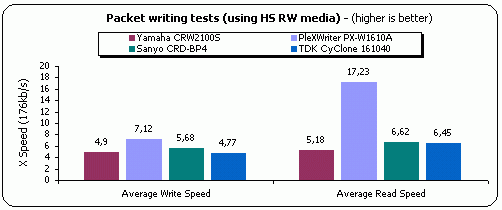
Yamaha CRW2100S comes second in packet writing after the PX-W1610A (Yamaha
gave us 4.9x when the Plextor came up with 7,12x). The other 2 drives are slower
when writing/reading HS RW media in packet writing mode: (Sanyo: 4.51x, TDK:
4.77x).
Verdict of CDR-W Results:
The Yamaha CRW2100S certainly is not the best choice for RW writing. Even
though the drive supports the new HS RW writing mode, it fails to achieve the
higher (10x) writing speed of it. The competition supports 10x writing and CRW2100S
has no luck against it. Even in the packet-writing test, which Yamaha supposed
to support 10x, the speed is not exactly this. It begins with 4x and increases
to 10x at the end of the disc. That is probably why the results were that low
(4.96x writing). The competition however (TDK, SANYO) is worse, with only the
Plextor drive overwhelming the Yamaha by 32% faster...
7. Conclusion
Yamaha
CRW2100S SCSI CDR-W - Page
7
Conclusion
|
Positive (+) :
|
Negative (-) :
|
|
- 16x writer (even partial)
- 8MB of Buffer RAM
- Very stable when using Nero & a fast SCSI reader (on the fly copying)
- Very good DATA reading performance
- Very good DAE ripping performance
- Good CloneCD reading/writing performance
- Supports DAO-RAW
- Build-in protection for low quality media (lowers auto writing speed)
- Supports (even partial) HS RW standard
- Supports CD-Text
- Supports Overburning (burns up to 92:28mins)
|
- Not true 10x re-write drive :(
- Failed to read 10x HS RW written media
- Medium packet writing performance
- Noise when reading at max speed!!
- Some problems with LaserLock protected CDs
|
The Yamaha CRW2100S is a fair choice. It has a competitive price, while it
pays you back with it's performance in many cases. Those features are good weapons
against the hard competition from most of the other manufacturers, if we exclude
Plextor which is clearly the best choice - in case you don't want a SCSI protocol
drive. The PX-W1610A however is an ATAPI model, so we cannot make a fair comparison.
The lack of 10x RE-writing speed and the non-support of any anti-coaster (BURN-Proof,
Justlink) technology is what you will really miss from this drive. As far as
it concerns the DAO-RAW feature, it's here, performing pretty well when you
demand a backup of your protected cds, but needs some improving (reading LaserLock
protected CDs).
So... now we will have to answer: "Should you buy this drive?" or:
"Should you go for another one instead?"... The answer comes pretty
straightforward: If you want a fast SCSI drive and don't care about 10x RW,
nor anti-coaster technology, go for it! On the other hand, if you want the
fastest CDRW drive on the market and don't care about the SCSI protocol
(but you still want the benefits of BURN-PROOF technology though) you should
target for a Plextor as a first choice or a TDK Cyclone as a second one. After
that, Sanyo is your next SCSI option if you want to have both (SCSI+BURN-PROOF),
but with the price of not-so-fast reading Data/DAE and lack of DAO-RAW support...